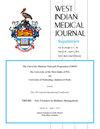术中右美托咪定能减轻全麻成人手术患者术后炎症反应吗?随机对照试验研究的荟萃分析
IF 0.3
4区 医学
Q4 MEDICINE, GENERAL & INTERNAL
引用次数: 0
摘要
目的:探讨右美托咪定(DEX)在各种手术中的抗炎作用。方法:对成人术中使用DEX进行随机安慰剂对照试验。主要结果是术后白细胞介素-6(IL-6)和肿瘤坏死因子-α(TNF-α)的浓度;次要结果是:术中和术后低血压和心动过缓。结果:共分析了7项随机对照试验,涉及424名不同类型手术的患者。TNFα的合并标准化平均差(SMD)分别为-0.33(95%CI:-0.41,-0.25,p<0.001)和-0.22(95%CI:-0.55,-0.09,p=0.001),IL-6在手术结束和术后第一天的合并标准差分别为-51.02(95%CI:-52.83,-49.21,p<001)和-19.67(95%CI:-21.15,-18.19,p<0.01)。结论:该荟萃分析显示,术中DEX可降低手术结束时和术后第一天的IL-6和TNF-α浓度。未来的研究应进一步详细探讨DEX的抗炎作用。本文章由计算机程序翻译,如有差异,请以英文原文为准。
Does Intraoperative Dexmedetomidine Attenuate Postoperative Inflammatory Response in the Adult Surgical Patients with General Anaesthesia? A Meta-analysis of Randomized Control Trials Studies
Objective: The study was done to investigate the postoperative anti-inflammatory effects of dexmedetomidine (DEX) in various surgical procedures. Methods: A search of randomized placebo-controlled trials for intra-operative DEX use in adults was conducted. The primary outcome was postoperative concentrations of interleukin-6 (IL-6) and tumour necrosis factor-alpha (TNF-α); secondary outcomes were: intraand post-operative hypotension and bradycardia. Results: A total of seven randomized controlled trials involving 424 patients with different types of surgeries were analysed. The pooled standardized mean difference (SMDs) were -0.33 (95% CI:-0.41, -0.25, p < 0.001) and -0.22 (95% CI:-0.35, -0.09, p = 0.001) for TNFα, -51.02 (95% CI:-52.83, -49.21, p < 0.001) and -19.67 (95% CI:-21.15, -18.19, p < 0.001) for IL-6 at the end of surgery and the first day after surgery, respectively. Conclusion: This meta-analysis showed that intra-operative DEX reduces postoperative concentrations of IL-6 and TNF-α at the end of surgery and the first day after surgery. Future studies should further explore the anti-inflammatory effects of DEX in detail.
求助全文
通过发布文献求助,成功后即可免费获取论文全文。
去求助
来源期刊

West Indian Medical Journal
医学-医学:内科
CiteScore
0.20
自引率
0.00%
发文量
0
审稿时长
4-8 weeks
期刊介绍:
The Journal is international in scope, with author and editorial contributions from across the globe. The focus is on clinical and epidemiological aspects of tropical and infectious diseases, new and re-emerging infections, chronic non-communicable diseases, and medical conditions prevalent in the Latin America-Caribbean region, and of significance to global health, especially in developing countries. The Journal covers all medical disciplines, as well as basic and translational research elucidating the pathophysiologic basis of diseases or focussing on new therapeutic approaches, and publishes original scientific research, reviews, case reports, brief communications, letters, commentaries and medical images. The Journal publishes four to six issues and four supplements annually. English is the language of publication but Abstracts are also duplicated in Spanish. Most of the articles are submitted at the authors’ initiative, but some are solicited by the Editor-in-Chief. Unless expressly stated, the Editorial Board does not accept responsibility for authors’ opinions.
All papers on submission are reviewed by a subcommittee. Those deemed worthy for review are sent to two or three reviewers (one of the three might be a statistician if necessary). The returned papers with reviewer comments are reviewed by the Editor-in-Chief. Papers may be rejected, accepted or sent back to authors for revision. Resubmitted papers from authors are reviewed by the Editor-in-Chief and may be sent back to reviewers or a final decision made by Editor-in-Chief. The decision of the Editorial Board is final with regards to rejected articles. Rejected articles will not be returned to the authors. The editorial subcommittee has the right to return sub-standard manuscripts to the authors, rather than passing them on to the reviewers. This implies outright rejection of the manuscript.
 求助内容:
求助内容: 应助结果提醒方式:
应助结果提醒方式:


